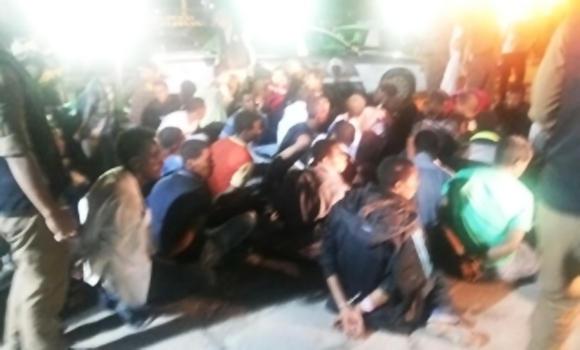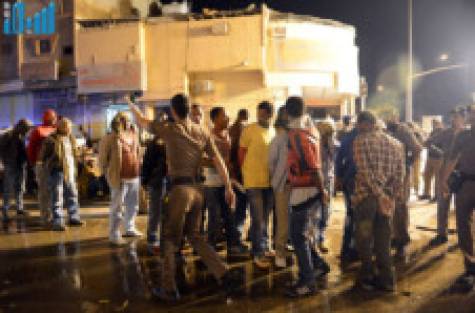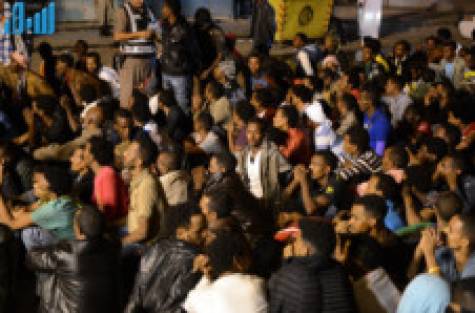Jeddah: Security forces were called in to maintain peace and order in Riyadh’s southern district of Manfouha on Saturday night after a group of men went on a rampage in anger at the Kingdom’s ongoing campaign against illegal foreign workers.
At least one local resident was reported dead of injuries from a hail of stones thrown by the rioters, who also smashed crs and shops.
Armed with knives, the rioters gathered in the district’s narrow streets early evening Saturday, threatening policemen, motorists, and pedestrians, witnesses and police said.
Anti-riot police fired guns into the air and used truncheons to disperse the large crowds, mostly foreigners who appeared to be Africans, notably Ethiopians.
According to local media reports, at least 65 were injured and taken to King Saud Medical City, Prince Salman Hospital and Al-Iman Hospital. The injured, mostly Saudis and legal residents, have suffered knife-stabbing wounds and bruises from the rioters, who were among those receiving hospital treatment.
A report by Sabq.com news site said one of the injured, a 32-year-old Saudi, died later in hospital. The man suffered a head injury from a stone thrown by the rioters.
A large security force cordoned off the central Riyadh district and closed its entry and exit points, arresting a number of the violent illegal workers and calling on the rest of them to turn themselves in, according to Brigadier General, Naser Al-Qahtani, media spokesman for Riyadh Police.
Saudi private citizens joined the police in arresting some of the rampaging illegal workers.
A shelter area has been arranged for the illegal workers on King Abdulaziz Road to speed up the process of their deportation in collaboration with other concerned government departments, Al-Qahtani said.
The acts of vandalism erupted amid strict government round-up of illegal workers across the Kingdom after the end of the amnesty period to legalize their residency and work status last week.
~ arabnews
On Monday, the authorities began rounding up thousands of illegal foreign workers following the expiry of a final amnesty for them to formalise their status.
Those considered to be illegal range from overstaying visitors and pilgrims seeking jobs to shop assistants and day labourers working for someone other than their sponsor.
Having an official sponsor is a requirement in Saudi Arabia and most other Gulf states.
Nearly a million migrants Bangladeshis, Filipinos, Indians, Nepalis, Pakistanis and Yemenis among them — took advantage of the amnesty to leave.
Another roughly four million were able to find employers to sponsor them, but in so doing virtually emptied the market of cheap freelance labour.
Expatriates account for a full nine million of the oil-rich kingdom’s population of 27 million.
Raids’ ferocity alarms holed-up illegal expats
Thousands of expatriates who refused to correct their status during the grace period are now having sleepless nights.
They have stayed away from work since Nov. 3 in the belief that the raids would end soon and it would be business as usual.
“I’m scared to death after seeing all those photos of handcuffed expats in newspapers and on social media sites,” said Nasir Lateef, a Pakistani in Riyadh. “We never expected the raids to be so ferocious.”
Lateef says he is not undocumented. “I have a valid iqama (residency permit), but I can be arrested during a raid because the profession on my iqama says I’m an accountant, while I’m actually an auto repairman.”
There are hundreds of workers like Lateef in Jeddah, Dammam and other cities who thought the raids would simply not take place, or that they would end in a week.
“The ferocity of the raids has alarmed us,” said Nayyar Siddiki, an Indian teacher. “Nobody wants to take the risk of venturing out,” he said from his home in the expat-dominated Aziziyah district.
Siddiki admits that it was wrong not to transfer his sponsorship to the school where he teaches. “I’m not alone, many of my colleagues thought that since they have iqamas they would not be arrested,” he said. “Now we are confused and rue the decision not to undergo the correction process.”
Those staying home are relying on what is termed in expat circles as “raid fatigue” on the part of the government.
“We are hoping that the inspectors and the security forces will call off the raids after one more week,” said Anisul Islam, a Bangladeshi gas station attendant in Dammam.
The government, however, has made it clear that there would be no letup in the raids. “This is a comprehensive and long-term Kingdomwide campaign,” said Brig. Mansour Al-Turki, the Interior Ministry spokesman, on Nov. 3 when the amnesty period ended.
The Labor Ministry has devised a comprehensive raid mechanism. In the first phase, officials raided areas with many expatriates including vegetable markets, industrial areas, auto-repair and paint shops. They arrested thousands of illegal workers. Inspectors have not yet raided commercial establishments and international schools.
There is near unanimity among Saudis that the government is doing the right thing.
“It’s now or never,” said Saeed Al-Shamrani, a teacher at a government school in Jeddah. “No country can accept undocumented and illegal workers on such a massive scale,” he said. “The numbers arrested indicate the magnitude of the problem.”
His colleague, Yahya Al-Dossary, agrees. “We are ready to suffer in the short term for a long-term solution. The government is doing the right thing. We need expats, but we need legal ones.”





